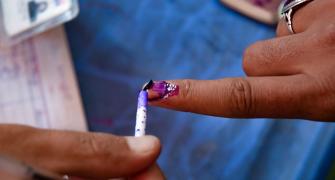Television rating points (TRPs) have done their bit. Now, it's the turn of RAM (radio audience measurement) to determine the ruler of the airwaves.
A recent survey carried out on radio channels' ratings or RAM brought to light some interesting facts. The results were announced on October 31.
The survey, conducted by TAM Media Research all across India, rated FM stations on different parameters like reach, listenership and the time spent listening. The research adopted the daily diary method, taking into account those above 12 years. The period of research was October 7-13.
According to the findings, the average weekly reach was almost equal for Mumbai and Bangalore (99.5 per cent and 99.6 per cent) whereas Delhi recorded a lower reach (96.6%).
Bangalore topped the highest time spent listening category (1,092 mins/week) compared to Mumbai and Delhi (845 and 796 mins/week, respectively).
The time spent on an average weekend (117 mins/day) in Delhi was found to be higher than that on an average weekday (108 mins/day). In Mumbai, the best performing time periods were 9-10 am and 11am-12 pm.
Big FM topped in Bangalore and Mumbai, and Mirchi in Delhi in terms of reach. Big FM identified with its name, emerging as the radio channel with widest reach, a big achievement in just one year. The channel boasts of having 34 stations.
Big FM held the top spot in India's IT capital, registering a market share of 24.5 per cent, followed by Times Group's Radio Mirchi at 20.1 per cent.
Tarun Katial, COO, BIG FM, said: "We are determined to sustain our performance. Our popularity is synonymous with 100 chartbusters. We plan to concentrate more on Bangalore and Mumbai. We are, undoubtedly, the winner in the two cities but market is very dynamic and we will have to keep improving."
Katial said that the radio industry was the first to come up with the idea of audience measurement, even before the advertisers and marketers. According to the latest RAM data (week ending October 20, 2007), Big 92.7 FM took the credit for reaching out to over 1.1 crore listeners cumulatively in three metros - Mumbai, Delhi and Bangalore. In Delhi, it was no. 2 in weekly reach.
The research was much awaited. As Siddhartha Mukherjee, vice-president (communications), TAM Media Research Pvt Ltd, said: "The idea was to give the marketers a good understanding of radio and its consumption (listenership trends).
Radio is the oldest medium in India but due to lack of measurement and research tools, it did not grow at the same pace as other mediums. Television and print media have seen phenomenal growth due to TRPs and circulation numbers. However, now with RAM data available, marketers will be able to use radio channels more effectively."
The data were collected from Delhi, Mumbai and Bangalore, and would help the radio channels in recognising target audience better. "Like TAM, RAM too is a continuous panel-based study. As a result, marketers, media agencies and radio channels should now be able to reap the same benefits from radio as well. Currently, radio constitutes 3 per cent of the total ad pie. With RAM in place, more ad revenue show flow towards radio, enabling it to double its revenue like TV," said Mukherjee. He said that with the level of insight that the RAM data offered, radio was all set to become a strategic medium.
FEVER FM was ranked no. 2 with a market share of 12 per cent. However, in Delhi it was fourth in terms of reach.
Gowri Satyamoorthy Karpe, national head (marketing and promotions), FEVER FM, said: "The research will help us slice our audience in terms of demographics and time, and plan our marketing and promotional events."
The research would assist marketers and advertisers in buying air time and planning promotional activities. It would also help the radio industry to rake in higher revenue like television and print media. No doubt, the radio industry is on a roll.








